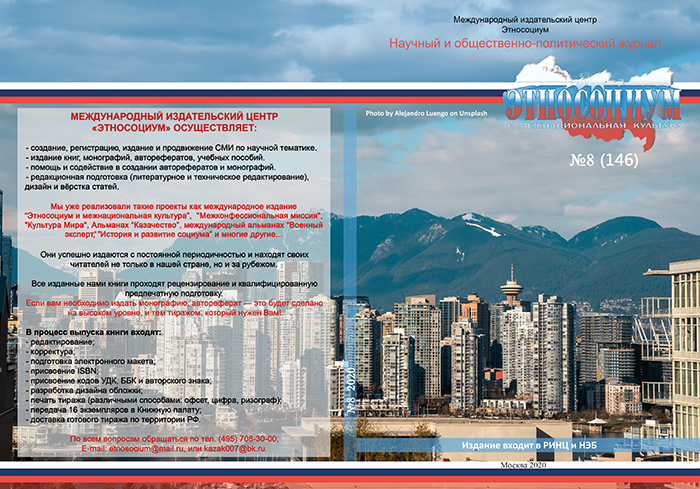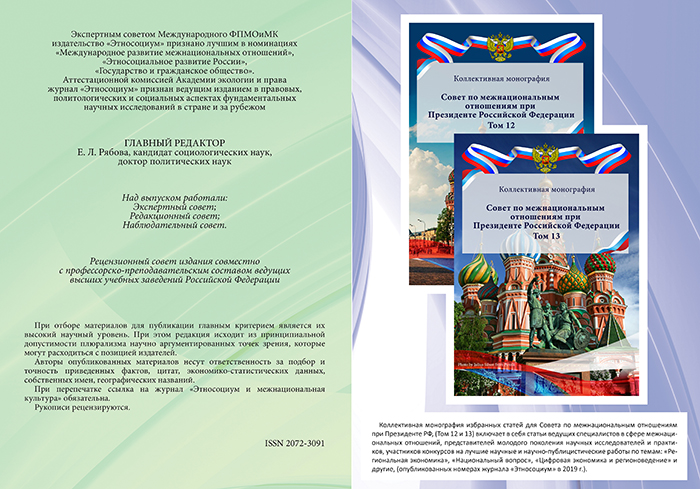

Content
|
COUNCIL OF INTERNATIONAL RELATIONSHIP
|
|
|
Komleva V.V., Akhatova A.R. Life strategies of youth in small cities of Russia (on the example of Bejetsc city, Tver region)
|
9
|
|
Komarov S.S. Orthodoxy and Human Rights through the Prism of Western Researchers
|
26
|
|
ACTUAL PROBLEMS OF MODERN SOCIETY
|
|
|
Bormotova T.M. Sociological analysis of mass media on the assessment of police activity
|
33
|
|
Zolotarev N.A. State policy of Russian export promotion: problems and prospects
|
39
|
|
REGIONAL STUDY
|
|
|
Lebed' E.S., Rybakov S.V. About the social role of the volunteer movement
|
48
|
|
Kim A.S., Dovgopolov E.Yu., Emelyanov P.S. The problem of identity in post-Soviet Russia from the perspective of the unitarian and pluralist approaches
|
57
|
|
INTERNATIONAL RELATIONSHIPS
|
|
|
Huang Mingtuo, Ma Heyao Peculiarities of self-identification of the Russian Diaspora in the post-soviet space and its value for Russia
|
70
|
|
Ilarionova T.S. German non-profit organizations in Russia: types, goals, regions
|
83
|
|
Miao Hui, Gu Li Chinese culture in Russian émigré literature in China
|
100
|
|
Filina N.V. To the issue of state-confessional policy in the BRICS countries
|
105
|
|
Prokopenko T.V. Transformation of the political communication system
|
110
|
|
REVIEW
|
|
|
Biryukov S.V., Murashko S.F. Italia: to understand the changes that are taking place
|
118
|
|
Abstracts
|
125
|
|
Authors
|
135
|
|
Requirements to materials submitted to the international publishing house "Etnosocium"
|
139
|
Small towns are a necessary element of the sustainability of the "urban framework" of our country, and young people are the basis for the full-fledged strategic development of any territory. Today, one of the most serious problems in the development of small towns is depopulation associated with a massive outflow of young people, which leads to a gradual devastation of the territories of small towns in the future. In turn, the study of the life strategies of the young population makes it possible to determine the reasons for the outflow of youth, which is relevant within the framework of state and municipal administration to find ways to solve the socio-economic problems of small towns. The article identifies the main factors influencing the formation of life strategies of young people, and provides the results of a study of strategies for the life of young people in a small town. The aim of the research is to identify the factors that determine the life strategies of young people in small towns (for example, the city of Bezhetsk, Tver region). For doing research general scientific methods of synthesis, analysis, and systematization were used, and a pilot sociological study was carried out. A certain scientific novelty is presented by the authors' approach to examining life strategies from a socio-economic point of view in combination with the well-established tradition of socio-psychological analysis of the life strategies of young people. Based on the analysis of the results of the pilot research and the current socio-economic situation in the city of Bezhetsk, the authors formulated recommendations for local governments to solve the demographic problem of the outflow of youth.
Keywords: life strategies of youth, socio-economic development of small towns, outflow of youth, conditions for the formation and implementation of life strategies.
The issue of interaction between religion and human rights is relevant not only for the Western community, but also for Russian science. Different approaches of interpreting the interaction of these two institutions differ greatly. However, considering the ideas of Western scientific community, a single line of critical attitude of Russian Orthodoxy to the modern liberal concept of human rights can be traced, which is partly confirmed by the logic of statements by representatives of the church.
Keywords: Orthodoxy, democracy, human rights, church.
The author of the article, in the course of the research by the method of content analysis, compares the plots in articles of Internet publishing houses about the activities of the police, which made it possible to identify the features of the reflection of information in the media, as the most subjective tool for assessing the activities of the internal affairs bodies.
Keywords: content analysis, police activity, online publications, mass media, population, public opinion.
The problem of export support reaches a new level. The geopolitical situation and violation of the rights of exporters due to trade wars have a great impact on exports. The author systematizes a set of problems of the existing export support system, the solution of which will determine the prospects for its development. It is established that the solution of the problems, which are shown in the article, is associated with insufficient infrastructure for supporting enterprises in various industries.
Keywords: external demand, exports, economic institutions, Russia, state policy, sanctions, protectionism of export industries.
The article analyzes the broad public role of the volunteer movement, which in recent years has acquired a large scale on a global scale, as well as at the level of individual States and regions. The directions of volunteer activity, its possibilities for stabilizing social relations, socio-psychological and economic benefits, and educational significance are shown.
Keywords: volunteer movement, UN initiative for the development of volunteerism, economic effect of volunteerism.
The authors consider the problem of identity in post-Soviet Russia from the point of view of a combination of unitarian and pluralist approaches. Attention is paid to the relationship between social inequality and identity in a multi-component (multicultural) society. The article substantiates the proposition that it is constructive in solving the problem of identity in a multi-component society not to level the differences, but to manage them in the aspect of combining socio-political diversity and multiculturalism.
Keywords: identity, consensus, multi-component society, multiculturalism, inequality, post-Soviet period, the problem of identity, social solidarity, unitarian and pluralist approaches, values.
After the collapse of the USSR in the countries of the "near abroad" a huge number of compatriots abroad, known in social science as the "Russian diaspora", arose. The article discusses the features of self-identification of the Russian diaspora. This is an important issue for Russia: the Russian diaspora is an important diplomatic tool, is able to alleviate the demographic crisis in Russia, and can contribute to the spread of the Russian language and culture abroad. Russia needs to optimize its policy towards the Russian diaspora in the post-Soviet space. Otherwise, Russia threatens to lose one of the most important sources of influence on neighboring countries.
Keywords: Russian diaspora, compatriots abroad, post-Soviet space, Near Abroad, identity.
The author considers the development of non-profit organizations of Russian Germans in the context of changing legislation on NPOs. Based on the analysis of statistical data on registered organizations, their comparison with data from 2016, a conclusion is drawn about a significant change in civic activity in Russia.
Keywords: Russian Germans, non-profit organizations, civil society.
The article examines the historical conditions of the appearance of Russian emigrants in Kiai and the background of the work of Russian emigrant writers and emigrant poets who lived in China for about 50 years and wrote many literary works describing the nature of China. These works, which have enriched Chinese and Russian literature and culture, are essential for cultural communication between the two countries even today. The scientific novelty of the research consists in the analysis of the hidden meaning of images, symbols, myths in the works of Russian émigré writers, as well as in the study of the contribution of Russian émigré writers to the dissemination of Chinese and Russian literature and culture.
Keywords: CER, Harbin, Russian émigré literature in China, Chinese culture, relevance.
The article analyzes the state-confessional policy of the BRICS countries. Features of confessional policy are distinguished taking into account systemic characteristics. The key subject of the study was relations between the government, society, religious organizations from the position of the US Commission on International Religious Freedom (USCIRF). The legal framework of some countries has established a secular character, which refers to the separation of power from religion. At the same time, there is an isolation of traditional religious denominations, which very often causes social tension and the emergence of conflicts on religious grounds. The state-confessional policy of the BRICS countries is aimed at preserving the integrity of the state, protecting the rights of believers, and preventing manifestations of various kinds of religious intolerance in society.
Keywords: state-confessional policy, religious organization, BRICS, commission.
The article examines the development trends of the political communication system as an important component of the political system of modern Russian society. Particular attention is paid to the processes of transformation of the functional aspect of the political communication system. The author comes to the conclusion that an increase in the number of dysfunctional effects in the field of political communication may pose a threat to the stable development of the political system and society as a whole.
Keywords: political system, political communication, actor, social networks, network society.
The review evaluates the monograph presented by the authors and considered the processes of political and cultural transformation of modern Italy. A generalized analysis of the content of the monograph is given, author of review highlights and marks its advantages. In addition, the author of review considers the prospects and possibilities of using cross-cultural analysis in the framework of country studies and regional political studies, especially in relation to countries that were consolidated relatively late as unified political Nations and are characterized by large-scale interregional differences.
Keywords: Italy, cultural contradictions, political development, civil culture, common good, civil society.